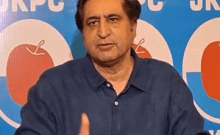Following in the footsteps of Cameroon and Chad, Senegal too is considering on a ban on burqas for ensuring national security.
Mounting threat to national security from the Nigerian Islamic militant group Boko Haram has incited the current debate on the full bodied burqas which allow terrorists to conceal bombs on their body.
The interior minister, Abdoulaye Daouda, said, "Women would no longer be allowed to wear the Islamic dress, which leaves only the eyes exposed."
In spite of having 92% Muslims, the west African country is considering the move, the Guardian reported.
"We should not allow someone to cover their entire body like terrorists do. This is a tradition of some countries but it has nothing to do with Islam. The reason terrorists use this method was because they wanted to attack the religion," Mbaye Niang, a Muslim leader and Member of Parliament, told the local newspaper Le Quotidien.
"Senegal is just following the trend," said Martin Ewi, a senior researcher at the Institute for Security Studies. The Guardian quoted him as saying, "You still have the villages and far corners of the country where people don't always respect the ban."
Ewi, warning about the efficiency of the ban, brings up the suicide bombing that took place in Chad, killing 27 including several police officers, after the ban was place.
"They deliberately wore the burqa to attract the attention of the police," Ewi said.
Raising concerns over infringement of individual rights, Khadim Mbacke, a Dakar-based researcher, said, "Its imposition in Senegal will cause social instability ... there is a delicate line between preventive measures and respect for individual freedoms."
Defending the decision taken in the west African countries, Farid Essack, a religious studies scholar at the University of Johannesburg, told The Guardian, "In some political contexts, I find [the banning of burqas] deeply disturbing and an extension of Islamaphobia. I don't think that the Chadian response is a manifestation of Islamophobia. Chad ... has had several bombings, a number of them were seemingly perpetrated by [fully covered] men, and I don't think that it is unreasonable, in that context, to insist people should not be completely veiled in public."
Recently, the country ran a nationwide search for militants, arresting five people who were suspected of having ties with Boko Haram, in a crackdown on militancy.

















